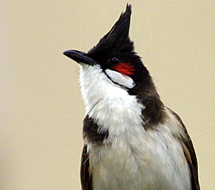|
Identification:
This black cardinal-sized bird from Asia is a major pest of agriculture and gardens in areas where it has escaped the pet cage and established in the wild. It is around 8 in long, with a black body, eyes, and beak and a bright red patch under the tail. Males and females are similarly colored. This is the only black bird in Hawaii with a cardinal-like feather crest on its head. Listen to the red-vented bulbul's distinctive call.
Impacts: The red-vented bulbul feeds on fruits, vegetables, flower buds, and insects. It is estimated to cost $300,000 in damages to orchids per year on Oahu. Bulbuls are very agressive birds and could compete with other desireable birds for nesting and foraging areas. This bird is a Hawaii State injurious animal, making it illegal to import them to the state, transport them to places they do not exist, release them into the wild, or export them from the state.
Dispersal Mechanism: Red-vented bulbuls have been known to nest in shipping containers and can possibly fly over inter-island ocean channels. These birds are common on Oahu, and have been spotted on Molokai and the island of Hawaii. If you see it anywhere else on Kauai, Maui, Molokai, Lanai, or the Big Island- let someone know!
More information about this pest 
|

|
|
Red whiskered bulbul (Pycnonotus jocosus)
|
|
Red-whiskered bulbul (Pycnonotus jocosus):
The red-whiskered bulbul, or red-whiskered cardinal, is also found on the island of Oahu. It is slightly smaller than the red-vented bulbul, and has distinctive red patches of feathers on its cheeks. This bird is not native to Hawaii, and is also a Hawaii State injurious animal. If you see this bird anywhere but Oahu, let someone know!
|